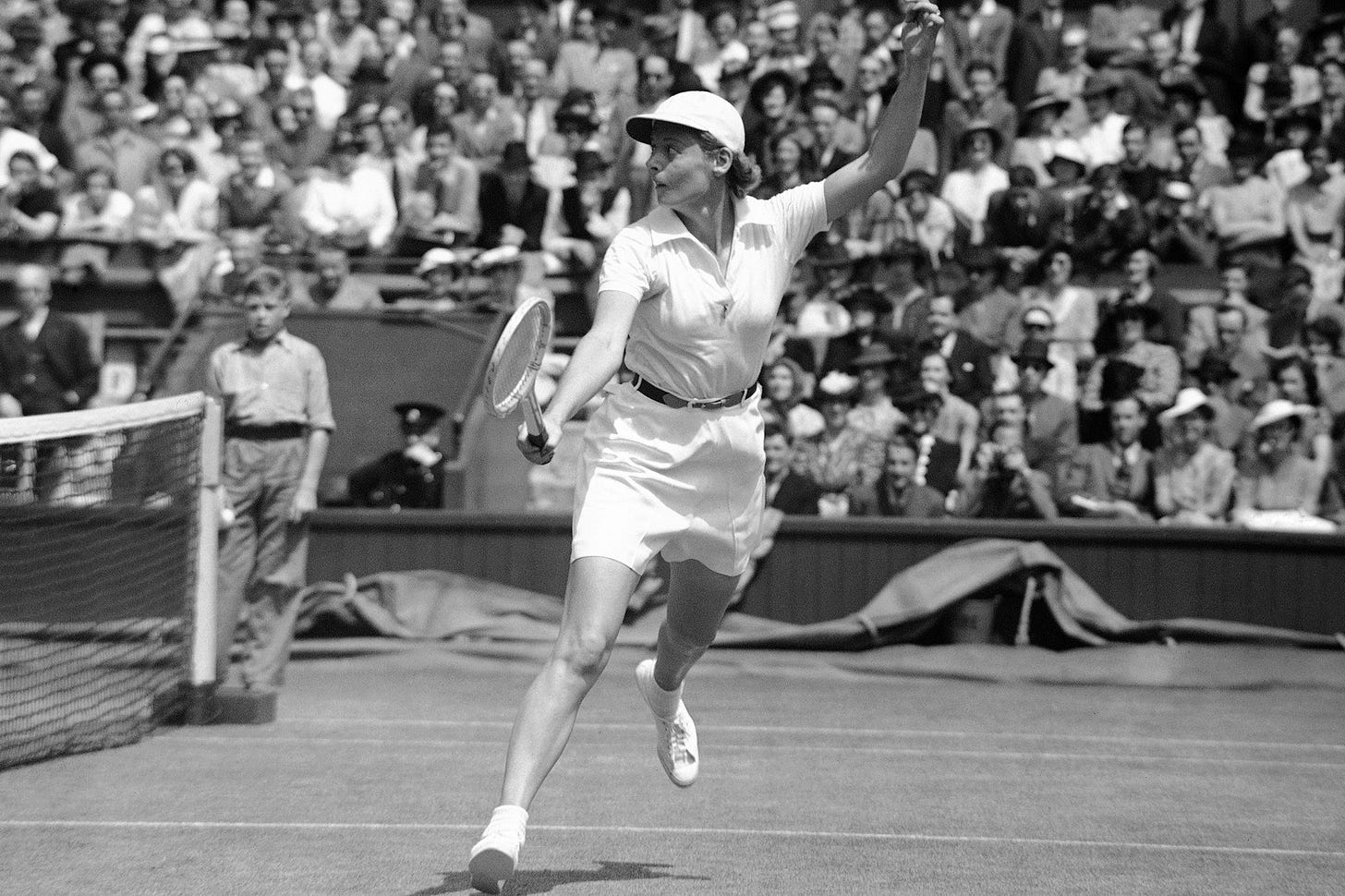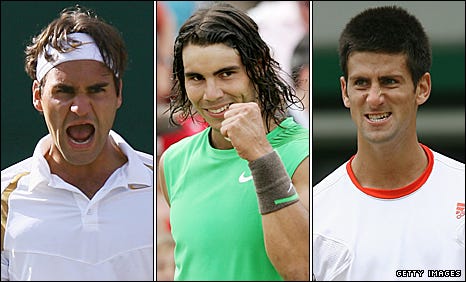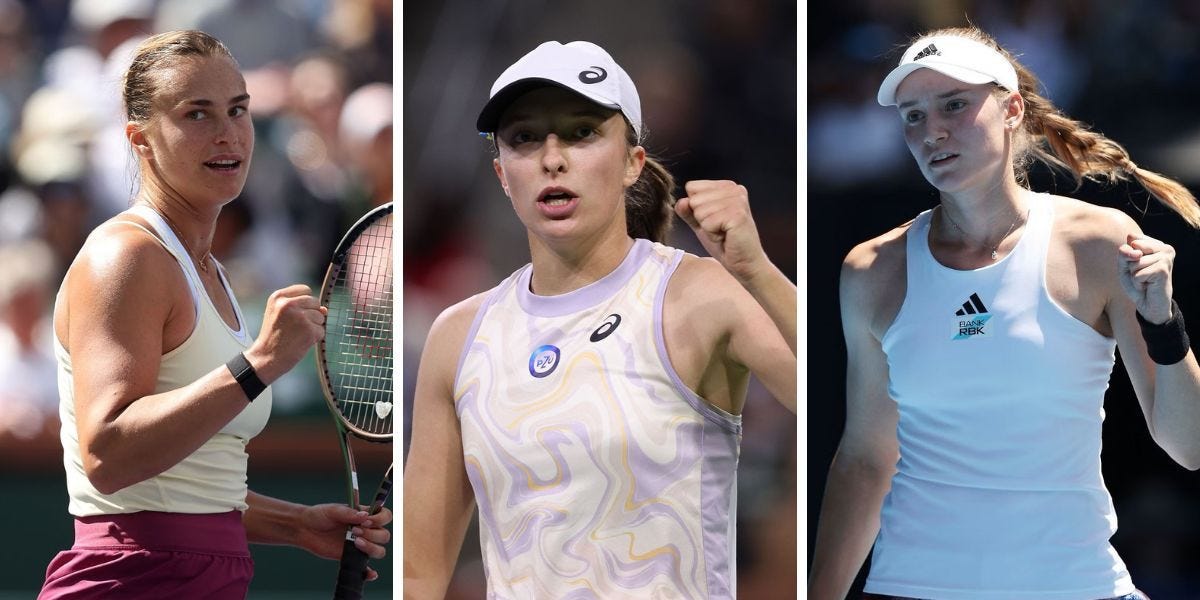The Big Three and the Future of Nostalgia
On marketing in tennis, and why we can't seem to escape the inertia of the past
As has been well established by now, I’m not particularly a fan of talking about the Big Three. Actual tennis journalists have, by now, excavated about every gem in that particular mine. So, it is with great reluctance that I have decided to address this topic. But, simply put, enough is enough, and I am staging an intervention.
I hear you, dear reader, through my screen asking “May, what are you talking about? What do you mean ‘intervention?” And, perhaps, you have come across this article far enough into the future that the Big Three don’t immediately feature in basically every conversation about tennis. To you, I say that I am heartily jealous. Not because I have a particular vendetta against the Big Three per-se, but rather because I wish with every fibre of my being that we were capable of talking about all of the exciting new developments happening in tennis without resorting to the well worn groves that the “Big Three” narrative provides us.
This is, of course, my personal opinion. You might not be guilty of any of these behaviours. However, frankly, I think we as a community can do better for both ourselves and the players that we support than simply framing all of their hard work and charisma and talent as simply a regurgitation of something that’s already happened. And it’s not just this ridiculous graphic somehow implying a millennial father and a teenager belong to the same generation, but all of the WTA posts proclaiming a new “Women’s Big Three.” I mean, come on!
Having stars to market the sport means more viewers, which translates back to more investment in the sport, which means more children are attracted to the sport, thus producing more stars. This virtuous cycle relies on having big players, like a Serena or a Venus or a Nadal or a Federer for it to perpetuate itself. The problem here for men’s tennis is that the Big Three aren’t going to last forever—in order to continue to have the sorts of big narratives that attract people to the sport, star power is required.
Of course, comparing the potential of these players to greats is definitely not an insult, and I absolutely don’t want to imply that it is. But at the same time, the burden of expectation is not easy to meet—let alone expectations that are created for another person that are then imposed back onto you. If I can’t even keep a consistent blog upload schedule, how can I possibly expect—nay sometimes demand—that a bunch of professionals replicate the careers of the best people to ever play their sport, beat for beat?
I think the way that we treat players that don’t live up to this inevitable hype is quite telling. Shapovalov was once heralded as potentially being one of the next greats, but is now frequently derided as a flop. We are just as eager to laugh at a player on their way down as we are to herald them as the next big thing when they succeed. The higher you are built up, the further there is to fall. Quite simply, I don’t think this is fair, especially when these players aren’t particularly inviting these comparisons to begin with.
This obsession with formulating the future as a remix of the past goes hand in hand with an obsession with youth and youthful talent that the tennis press seem to have. If this were a localised phenomenon, I wouldn’t be caring that much, but this obsession with youth is something that seeps through much of media culture. I don’t think it’s just a tennis tendency to both extol the virtues of youth while attempting to stuff it into the pre-formed tropes of the past—I think this is probably just an innate human tendancy.
Simply put, youth is one of those resources like helium and patience that feels infinite until you’re confronted with the cold reality of its limitations. Youth is fleeting, and after youth comes the harsh reality of adulthood. When great potential is recognised, it’s natural to cling to it. After all, how many people really get to master their craft? How many of us even have a craft to master at all? Part of ageing is replacing potential with harsh consequences and unmet expectations. Are we so obsessed with the seemingly infinite potential of “the next Nadal” or “the WTA Big Three” because we genuinely view this as a unique and exciting moment in tennis history, or are we transmuting our own anxieties about our (perhaps unmet) potential onto others?
The future is scary and unknown. I have no idea how it’s going to shake out. In comparison, the past is knowable and understandable. I can divide the world up as I have already experienced it. The downside is that experiencing the world like this closes me off to new experiences. In the quest to make everything a familiar remix of what has already happened, I am never able to fully appreciate the unique and beautiful things that life can occasionally throw your way.
I profoundly feel this fear, that life has passed me by before it’s even begun. I know when I’m a decade older digging through old blog posts I’m going to scoff at how young and naive I was when I wrote this. But how can I avoid feeling the pressure of time when I am bombarded with advertisements for anti-ageing products all hours of the day, or when I am constantly and unconsciously comparing myself to basically every other young person courtesy of Instagram and Twitter?
Point blank: people being more talented and more young than me makes me feel inadequate. I feel like I’ve danced around this a bit in other pieces I’ve written, but it’s time to come clean. I don’t like these harsh reminders that my life has already begun to pass me by, and very soon I will lose whatever edge I have and calcify into middle age with very little to show for it.
I don’t like voicing this particular kind of anxiety, and I’m only doing it because I sense in some way that I am not alone. I’m not alone in this because it is a very nature and very human thing to spend part of our limited time on earth pontificating about how we’re wasting this time on things that aren’t particularly worthwhile. Frankly put, the boundless potential of the “next Nadal” or the “next Federer” makes me feel bad about all the times I sit in bed scrolling TikTok or eating Jammie Dodgers because I know that one day life will all be over and I will have very little to show for it except an exceedingly embarrassing screen time report.
It is a difficult thing, to surrender yourself to the future when you have yet to even make sense of the past. Life is overwhelming, and often feels like a blur. It’s not a coincidence that “they grow up so fast” or “the years just keep coming” are well worn cliches. Beneath these well trodden words is a deep truth, that we are allotted a limited time, and that allocating this time “correctly” is a nearly impossible task.
Unfortunately, life is always lived as a first draft, despite our best attempts to rehearse for the main event. We postpone when life is “really” lived by producing thresholds: my life will finally start when I lose 10 pounds, or when I get that promotion at work. By the time something of crucial importance has occurred, it almost feels like a scramble to try and comprehend it all. We then occupy a sort of homesickness for a past that will never return, for the ability to get to witness a rise to greatness all over again yet this time positioned perfectly to enjoy every intricate detail. It is precisely this desire that makes shedding the inertia of the past so difficult.
This is, of course, a massive generalisation. I am sure there are people out there who are capable of controlling the chaos of life to the extent that what I’m saying doesn’t even register. To those people, I heartily congratulate you and I want to know your secret to how you have it so together. But I, personally, find myself overwhelmed with the pace that life moves quite frequently.
It is through this careful transmutation of the future back into the comforts of the well worn past that christens Swiatek, Sabalenka, and Rybakina the next “Women’s Big Three,” and is of course responsible for much of the “Carlos Alcaraz is Nadal 2.0 hype.” Carlos Alcaraz is a ridiculously talented player—why do we insist upon doing that talent the disservice of being distilled into someone else’s narrative?
The Big Three are the Big Three. Their careers are happening (or have happened, sorry Roger) before our very eyes. We got to enjoy that for what it was, and we will forever have the insanely iconic matchups that this era of tennis produced (and continues to produce). However, forcing new players into this old format reduces our ability to approach tennis for the beautiful and ever-changing thing that it is.

Perhaps we are nostalgic for a particular era of tennis, perhaps there are people out there who wish they could re-experience the rise of the Big Three but this time fully on the lookout for particular moments of interest—the 2017 Australian Open, Wimbledon 2019, and so on. There is certainly a pleasure in being able to watch an entire career trajectory as it evolves.
The past and the future are not lived entities, not really. We eternally occupy the present, a teetering threshold between what—regrettably—was, and that which we fear will occur. This, of course, does not stop us from attempting to transcend the measly temporal boundaries with which our human forms are burdened. No, instead, we attempt to reconstruct the future in the past’s image, if for no other reason than to allow ourselves the luxury of falling into a familiar groove.
It is for this reason that I, personally, think that we can do better than rehashing every tennis event as some new iteration of the “Big Three.” The future is confusing and shrouded in mist. We do our best to predict it, but we should be careful to do justice to the present that we live in. After all, one day it will be the very past that we crave to resurrect.





I'm glad you wrote this because I've grown increasingly annoyed with the "Alcaraz is The Whole Big Three Put Together" narrative. It feels like a hilariously cold-hearted marketing strategy for a career that's really only just starting. I also think the "women's big three" idea is actively insulting to several players that are consistently still in there, like Jabeur, Krejcikova, and Pegula. The concept feels so flimsy and recency-biased that if just one match had gone differently a few months ago "the women's big three" would definitely include Jabeur, or maybe would not include Sabalenka.
Well written - thanks for this!